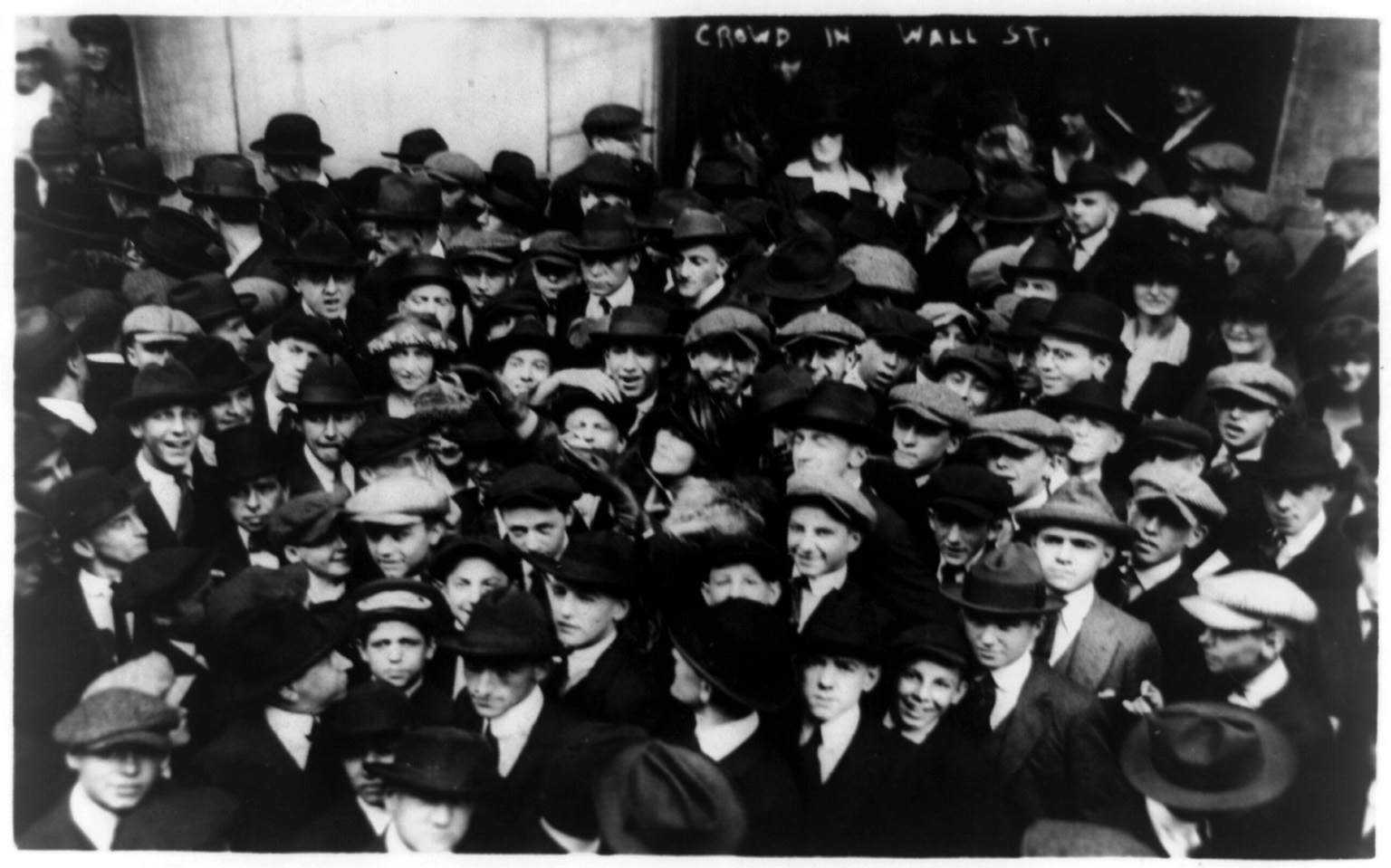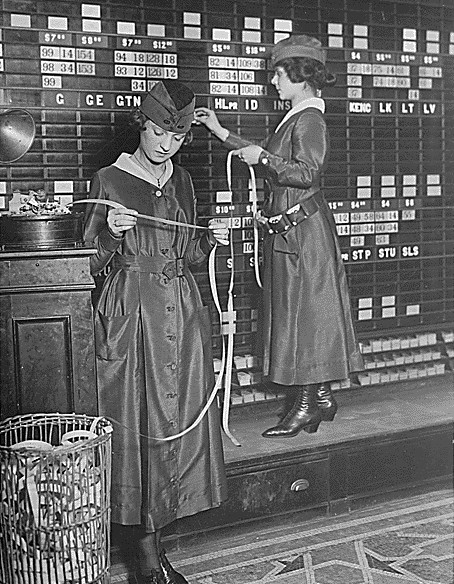|
Consolidated Tape System
The Consolidated Tape System (CTS) is the electronic service, introduced in April 1976, that provides last sale and trade data for issues admitted to dealings on the American Stock Exchange, New York Stock Exchange, and U.S. regional stock exchanges. The Consolidated Tape Association (''CTA'') is the operating authority for both the Consolidated Quotation System (CQS) and the Consolidated Tape System (CTS). See also * Market data * National market system plan * Ticker tape Ticker tape was the earliest electrical dedicated financial communications medium, transmitting stock price information over telegraph lines, in use from around 1870 through 1970. It consisted of a paper strip that ran through a machine called ... References Financial markets Self-regulatory organizations in the United States {{Stockexchange-stub ... [...More Info...] [...Related Items...] OR: [Wikipedia] [Google] [Baidu] |
Trader (finance)
A trader is a person, firm, or entity in finance who buys and sells financial instruments, such as forex, cryptocurrencies, stocks, bonds, commodities, derivatives, and mutual funds in the capacity of agent, hedger, arbitrageur, or speculator. Duties and types Traders buy and sell financial instruments traded in the stock markets, derivatives markets and commodity markets, comprising the stock exchanges, derivatives exchanges, and the commodities exchanges. Several categories and designations for diverse kinds of traders are found in finance, including: *Bond trader *Floor trader *Hedge fund trader *High-frequency trader *Market maker *Pattern day trader * Principal trader * Proprietary trader *Rogue trader *Scalper *Stock trader Income According to the Wall Street Journal in 2004, a managing director convertible bond trader was earning between $700,000 and $900,000 on average. See also *Commodities exchange *Commodity market *Derivatives market *List of commodity traders *Li ... [...More Info...] [...Related Items...] OR: [Wikipedia] [Google] [Baidu] |
Stock
In finance, stock (also capital stock) consists of all the shares by which ownership of a corporation or company is divided.Longman Business English Dictionary: "stock - ''especially AmE'' one of the shares into which ownership of a company is divided, or these shares considered together" "When a company issues shares or stocks ''especially AmE'', it makes them available for people to buy for the first time." (Especially in American English, the word "stocks" is also used to refer to shares.) A single share of the stock means fractional ownership of the corporation in proportion to the total number of shares. This typically entitles the shareholder (stockholder) to that fraction of the company's earnings, proceeds from liquidation of assets (after discharge of all senior claims such as secured and unsecured debt), or voting power, often dividing these up in proportion to the amount of money each stockholder has invested. Not all stock is necessarily equal, as certain classe ... [...More Info...] [...Related Items...] OR: [Wikipedia] [Google] [Baidu] |
American Stock Exchange
NYSE American, formerly known as the American Stock Exchange (AMEX), and more recently as NYSE MKT, is an American stock exchange situated in New York City. AMEX was previously a mutual organization, owned by its members. Until 1953, it was known as the New York Curb Exchange. NYSE Euronext acquired AMEX on October 1, 2008, with AMEX integrated with the Alternext European small-cap exchange and renamed the NYSE Alternext U.S. In March 2009, NYSE Alternext U.S. was changed to NYSE Amex Equities. On May 10, 2012, NYSE Amex Equities changed its name to NYSE MKT LLC. Following the SEC approval of competing stock exchange IEX in 2016, NYSE MKT rebranded as NYSE American and introduced a 350-microsecond delay in trading, referred to as a "speed bump", which is also present on the IEX. History The Curb market The exchange grew out of the loosely organized curb market of curbstone brokers on Broad Street in Manhattan. Efforts to organize and standardize the market started early in ... [...More Info...] [...Related Items...] OR: [Wikipedia] [Google] [Baidu] |
New York Stock Exchange
The New York Stock Exchange (NYSE, nicknamed "The Big Board") is an American stock exchange in the Financial District of Lower Manhattan in New York City. It is by far the world's largest stock exchange by market capitalization of its listed companies at US$30.1 trillion as of February 2018. The average daily trading value was approximately 169 billion in 2013. The NYSE trading floor is at the New York Stock Exchange Building on 11 Wall Street and 18 Broad Street and is a National Historic Landmark. An additional trading room, at 30 Broad Street, was closed in February 2007. The NYSE is owned by Intercontinental Exchange, an American holding company that it also lists (). Previously, it was part of NYSE Euronext (NYX), which was formed by the NYSE's 2007 merger with Euronext. History The earliest recorded organization of securities trading in New York among brokers directly dealing with each other can be traced to the Buttonwood Agreement. Previously, securiti ... [...More Info...] [...Related Items...] OR: [Wikipedia] [Google] [Baidu] |
Regional Stock Exchange
A regional stock exchange is a term used in the United States to describe stock exchanges that operate outside of the country's main financial center in New York City. A regional stock exchange operates in the trading of listed and over-the-counter (OTC) equities under the SEC's Unlisted Trading Privileges (UTP) rule. History of regional stock exchanges The SEC was formed in 1934, and that year, a total of 24 securities exchanges registered with the SEC, while 19 received temporary exemptions from registration. Exchanges actively trading that year included the New Orleans Stock Exchange, the Richmond Stock Exchange, the San Francisco Curb Exchange, the San Francisco Mining Exchange, and the St. Louis Stock Exchange. Ten stock exchanges closed after the SEC was created, including the Boston Curb Market, the Buffalo Stock Exchange, the Chicago Curb Exchange, the Denver Stock Market, the Hartford Stock Market, the Milwaukee Grain and Stock Exchange, the New York Mining Exchange, t ... [...More Info...] [...Related Items...] OR: [Wikipedia] [Google] [Baidu] |
Consolidated Tape Association
The Consolidated Tape Association (CTA) oversees the dissemination of real-time trade and quote information (market data) in New York Stock Exchange (NYSE) and American Stock Exchange (AMEX) listed securities (stocks and bonds). It is currently chaired by Emily Kasparov of the Chicago Stock Exchange, the first woman and the youngest chair elected to the position. CTA manages two Plans to govern the collection, processing and dissemination of trade and quote data: the Consolidated Tape Plan, which governs trades, and the Consolidated Quotation Plan, which governs quotes. The Plans were filed with and approved by the Securities and Exchange Commission (SEC) in accordance with Section 11A of the Securities Exchange Act of 1934. Since the late 1970s, all SEC-registered exchanges and market centers that trade NYSE or AMEX-listed securities send their trades and quotes to a central consolidator where the Consolidated Tape System (CTS) and Consolidated Quotation System (CQS) data str ... [...More Info...] [...Related Items...] OR: [Wikipedia] [Google] [Baidu] |
Consolidated Quotation System
The Consolidated Quotation System (CQS) is the electronic service that provides financial quote, quotation information for stock traded on the American Stock Exchange, New York Stock Exchange, and other regional stock exchanges in the United States and also includes issues traded by Financial Industry Regulatory Authority, FINRA member firms in the third market. Nasdaq, NASDAQ processes this data and provides it to its subscribers as the Composite Quotation Service. The initials CQS may be used either for the exchange system or the NASDAQ service. History In July 1978, the U.S. Securities and Exchange Commission declared the National market system plan, Consolidated Quotation Plan effective. In August 1978, the CQS commenced full operation with the Boston Stock Exchange, Boston, Chicago Stock Exchange, Midwest, New York Stock Exchange, New York, Philadelphia Stock Exchange, Philadelphia and Pacific Exchange, Pacific Stock Exchanges reporting quotations in NYSE-listed securities. ... [...More Info...] [...Related Items...] OR: [Wikipedia] [Google] [Baidu] |
Market Data
''For market data as used in marketing, see marketing information system'' In finance, market data is price and other related data for a financial instrument reported by a trading venue such as a stock exchange. Market data allows traders and investors to know the latest price and see historical trends for instruments such as equities, fixed-income products, derivatives, and currencies. The market data for a particular instrument would include the identifier of the instrument and where it was traded such as the ticker symbol and exchange code plus the latest bid and ask price and the time of the last trade. It may also include other information such as volume traded, bid, and offer sizes and static data about the financial instrument that may have come from a variety of sources. There are a number of financial data vendors that specialize in collecting, cleaning, collating, and distributing market data and this has become the most common way that traders and investors get a ... [...More Info...] [...Related Items...] OR: [Wikipedia] [Google] [Baidu] |
National Market System Plan
A national market system plan (or NMS plan) is a structured method of transmitting securities transactions in real-time. In the United States, national market systems are governed by section 11A of the Securities Exchange Act of 1934. In addition to processing the transactions themselves, these plans also emit the price, volume data, and regulatory auditing information for these transactions. Information on each securities trade is sent to a central network at the Securities Industry Automation Corporation (SIAC) where it is then distributed, consolidated with other trades on the same "tape". There are three major tapes in the United States: Tape A and Tape B (which together are called the "Consolidated Tape"), and Tape C. CTA/CQ Plans (Consolidated Tape) The Consolidated Tape is overseen by the Consolidated Tape Association. OTC/UTP Plan Tape C contains stocks listed on the NASDAQ Exchange or NASDAQ Small Cap Market, and is overseen by the OTC/UTP Operating Committee.{{cit ... [...More Info...] [...Related Items...] OR: [Wikipedia] [Google] [Baidu] |
Ticker Tape
Ticker tape was the earliest electrical dedicated financial communications medium, transmitting stock price information over telegraph lines, in use from around 1870 through 1970. It consisted of a paper strip that ran through a machine called a stock ticker, which printed abbreviated company names as alphabetic symbols followed by numeric stock transaction price and volume information. The term "ticker" came from the sound made by the machine as it printed. The ticker tape revolutionized financial markets, as it relayed information from trading floors continuously and simultaneously across geographical distances. Paper ticker tape became obsolete in the 1960s, as television and computers were increasingly used to transmit financial information. The concept of the stock ticker lives on, however, in the scrolling electronic tickers seen on brokerage walls and on news and financial television channels. Ticker tape stock price telegraphs were invented in 1867 by Edward A. Calahan, ... [...More Info...] [...Related Items...] OR: [Wikipedia] [Google] [Baidu] |
Financial Markets
A financial market is a market in which people trade financial securities and derivatives at low transaction costs. Some of the securities include stocks and bonds, raw materials and precious metals, which are known in the financial markets as commodities. The term "market" is sometimes used for what are more strictly ''exchanges'', organizations that facilitate the trade in financial securities, e.g., a stock exchange or commodity exchange. This may be a physical location (such as the New York Stock Exchange (NYSE), London Stock Exchange (LSE), JSE Limited (JSE), Bombay Stock Exchange (BSE) or an electronic system such as NASDAQ. Much trading of stocks takes place on an exchange; still, corporate actions (merger, spinoff) are outside an exchange, while any two companies or people, for whatever reason, may agree to sell the stock from the one to the other without using an exchange. Trading of currencies and bonds is largely on a bilateral basis, although some bonds trade o ... [...More Info...] [...Related Items...] OR: [Wikipedia] [Google] [Baidu] |


